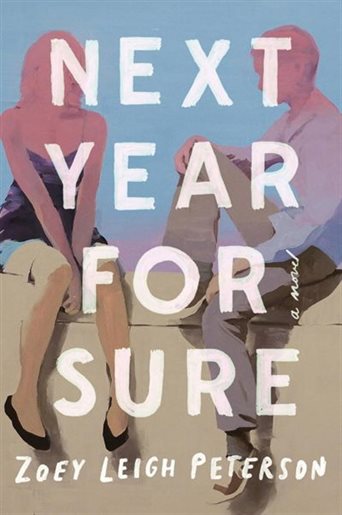
Review by Carly Rosalie Vandergriendt
It’s tempting to call Next Year, For Sure, a novel about a millennial couple that happens upon polyamory, a “light” read. Because in many ways, it is a light read. Award-winning short story writer and debut novelist Zoey Leigh Peterson’s prose is deceptively addictive, the kind of writing that can easily keep a reader up until two or three in the morning. (I read it twice; I stayed up late finishing it both times.) Her main characters, nine-years-and-still-going-strong couple Chris and Kathryn, are sensitive and self-aware yuppie Vancouverites who verge on being likeable to a fault. The novel opens with Chris telling Kathryn he has a crush on Emily, a woman he met at the laundromat. Kathryn suggests he take her out on a date, the plot takes off at a brisk pace, alternating between Chris and Kathryn’s point of view as they navigate opening their relationship up to a third person over the course of the year that follows.
Next Year, For Sure may feel like a light read, but Peterson manages to get at something fundamental about love, intimacy, and modern-day relationships. She is careful to present the challenges of non-monogamous relationships in a realistic way, and opts for a light-handed approach when subverting polyamorous stereotypes. For example, though Kathryn is the one to encourage Chris’s relationship with Emily in the first place, she wavers between acceptance, and yes, insecurity, while Chris, the more passive of the two, has a “high cuddle drive” (20) and is mostly uninterested in sex. Indeed, there’s very little sex in this book—readers who are drawn to the juicy premise (as I was) will get a story that’s more emotionally perceptive than they may have bargained for. As Chris and Kathryn explore their own complex feelings, form new bonds, and cope with the reactions of their friends, family, and even strangers, this story builds to a surprising but believable climax and resolution, which I won’t spoil here.
But Next Year, For Sure is at its most profound not in presenting what non-monogamous love might look like, but in highlighting the loneliness of most modern, monogamous relationships—and perhaps more generally, modern life. The secure, supportive long-term bond which Chris and Kathryn’s coupledom exemplifies is not a balm against sadness. One of the book’s most insightful moments occurs when Chris’s mother rebuts his assertion that both he and Kathryn are depressed, quipping, “You’re not sad…It’s called being an adult.” (163)
It takes an outsider to send Chris and Kathryn on their respective journeys of self-discovery. Chris, an introvert, mostly wants “someone to stay home…and play Scrabble with in [my] pyjamas.” (252) Still, he opts to take Kathryn up on her suggestion to date Emily because “one night a week he wants to grow as a person.” (220) Kathryn, on the other hand, longs to feel close—not in the romantic sense—to more than one person. This is explored further in the form of a clever and relatable subplot involving Kathryn’s best friend, Sharon. When Sharon, along with her soon-to-be-husband Kyle, moves to a condo in the suburbs and starts scheduling meetings with Kathryn weeks in advance, Kathryn wishes their once-close friendship were more like a “promise, that explicit understanding that [they] were bound to each other…for life.” (123) Both character arcs call into question prevailing beliefs about adulthood—for instance, that it’s normal for close friendships to wither as we enter middle age. Or that being “all grown up” means becoming stagnant, not growing at all.
Of course, not all readers will relate to these characters and the decisions they make as they attempt to fulfill their own needs while also supporting their partners’—yes, that’s a plural possessive—happiness. (See the book’s Goodreads page for reviews from readers who were self-professedly “too old-fashioned” to get this book.) But I think that’s the point. If you’re mononormative by default, Next Year, For Sure will challenge your beliefs. It may make you uncomfortable, but isn’t that the goal of all great literature? Peterson isn’t out to convert, but in this accessible novel, she does a fine job of laying out alternative options.
Carly Vandergriendt is a Montreal-based writer and translator whose work has appeared in The Fiddlehead, carte blanche, The Malahat Review, Plenitude, Matrix, Room, and elsewhere. Her story, “Resurfacing,” was shortlisted for the 2017 Carter V. Cooper short fiction prize. Visit her here or follow her @carlyrosalie.